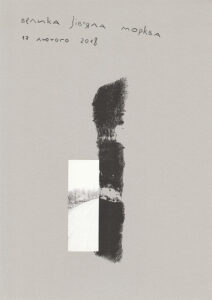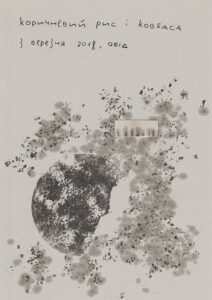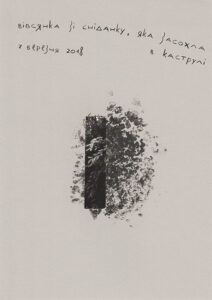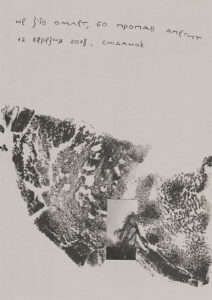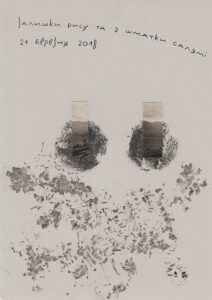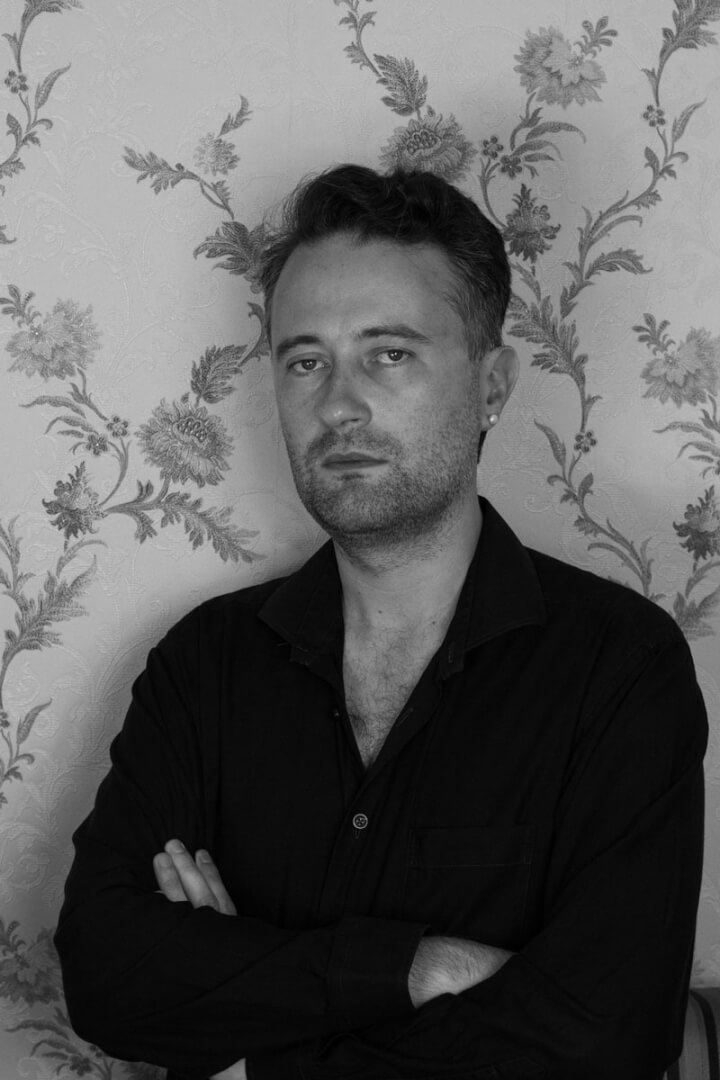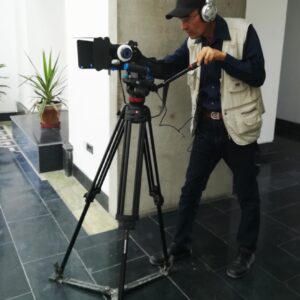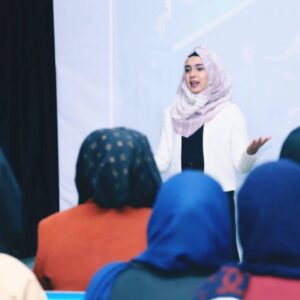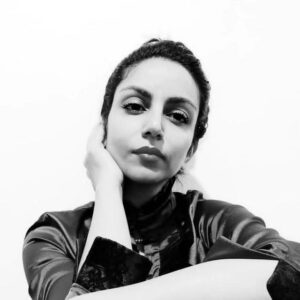I want to start the conversation with your short introduction. Can you introduce yourself and tell me about your artistic background?
I am an artist, curator, and photography researcher from Ukraine, based in Poland. I work a lot with memory, trauma, and identity — both personal and collective, decolonial practices in Eastern Europe, and also with vernacular photography of the region
You worked on the Holodomor. This topic was of particular interest to me and very scary. Before the war, I wanted to come to Ukraine and write a book about it. It is similar to the famine that Russia, Great Britain and the Ottomans created in Iran during the First World War. It caused the death of millions of Iranians(we call it the great famine)and the Armenian genocide by the Ottomans, in which there was also a deliberate famine.
? Can you please introduce your artwork about the famine in Ukraine (deliberate starvation during the Soviet era)
The series of ink prints titled “I still feel sorry when I throw away food — Grandma used to tell me stories about the Holodomor” which I did together with Lia Dostlieva is an attempt to look at the Holodomor (the man-made famine of 1932-33 in Soviet Ukraine) through the optics of post-memory. We tried to look at the historical tragedy, not through the historical images of the tragedy but through the trace, it left in the generation of our contemporaries imprinted through our family stories told by our grandmothers and grandfathers who had survived the hunger.
We focused on the subconscious sense of guilt that a lot of Ukrainians still experience when they throw away food. There are no logical reasons behind this sense of guilt, it originates in those stories about my family surviving this hunger. So we have produced a visual diary made of ink prints of all food that we were throwing out for several months. A diary of waste but at the same time a diary of the sense of guilt for throwing it away and, thus, of not always visible traces of collective trauma in our everyday practices.
Unfortunately for many new-generation Iranians and other Persian countries, Ukraine was not well-known before this war. I had general information because of my major. Still, I had always heard about Ukraine as a country with beautiful country with emotional and happy people from my parents and older people who had seen before 1979 the revolution. This was the issue that, along with the emotional and spiritual interest I felt for Ukraine, gave me the motivation to think that I could travel to Ukraine and write a book about this issue, but unfortunately, this was not possible.
What was the inspiration behind your art in this particular case? Did your Ukrainian nationality influence it or did another human emotion drive it?
Well, of course, my nationality, or rather self-identification, influences my work a lot. This self-identification is a package deal, it comes with family stories, generational traumas, geographical points of belonging, etc. And in my artistic practice, I really prefer to work with those topics where I have some sort of entry point. I am not a big fan of this sort of artistic trauma tourism when artists come to new places and totally foreign contexts and just pick something flashy and emotionally charged that just lies on the surface and do an art piece on that without any real understanding of the issues.
Did you have an artwork about the recent war? If so please introduce it, and if not, say whether you are thinking of having an artwork about this war?
Not since the full-scale invasion, at least nothing really big and serious. When my home region in Eastern Ukraine was occupied by Russia in 2014, it was easy to work with the topics of war and displacement because of my personal connection. Last year, I was already living in Poland and didn’t experience the war first-hand, so it feels just wrong to do some artwork directly related to the experiences that I don’t have.
Perhaps this is the most challenging part of our conversation. I would like to share with you an emotional letter written by the renowned Russian writer, Mikhail Shishkin, to the people of Ukraine. In his letter, Shishkin draws a comparison between the events in Ukraine and those of the Second World War. He mentions how his father never forgave Germany for killing his brother, the author’s uncle. Shishkin expresses his understanding of the difficult situation in Ukraine and extends his empathy towards its people. Like Shishkin, many Iranians who follow the news closely share similar feelings. We are aware that some countries involved in this war, such as Belarus, have become something akin to a colony. In some countries, people are either ignorant or brainwashed, while in others, they have no say in how their country is run. However, many Russians oppose the war and have even left their country in protest. Where I am, many Russians express their opposition to the war and participate in marches to show their disapproval. As a peace activist and a member of the global community, I want to speak to you beyond the boundaries of nations. We are all human beings, and we must ask ourselves what we can do to prevent war from destroying our humanity and turning us into enemies. Wars may be brutal, but they eventually come to an end, and we must continue to live together as neighbours and inhabitants of this planet. Not everyone participates in combat, and many people actively oppose it. Some even risk their lives for peace. I can see here some young Russians, non-Russians, and Ukrainians have come together in human rights associations to work towards a common goal.
Artists are usually emotional people, maybe not all of them are peaceful but most are emotional, how do you see the recent war with the eyes of an artist?
It is peculiar that you interview me as a Ukrainian artist and still expect me to read something written by a Russian and somehow react to that. The general sentiment among the Ukrainian cultural workers (which I also share) is that it is not the time for Russians to speak out, not to audiences outside Russia and not on any topic other than their shared responsibility as a society. Simple disapproval might have still worked for them in 2020 but now it is nowhere nearly enough. The only real opposition to the war they can express is by either actively fighting against their country or at least by supporting the Ukrainian army financially. The rest is just hastily covered attempts to improve their own well-being by moving to Western Europe or the US and playing victims in order to garner some benefits. And I’d refer you here to our previous article on informed listening to Russian voices in times of war:
https://blokmagazine.com/not-all-criticism-is-russophobic-on-decolonial-approach-to-russian-culture/
You want to speak to me beyond the boundaries of nations and you want to speak to me about the war whose first and foremost goal from the beginning was to erase or destroy the Ukrainian culture and identity. And those two things just do not work together. I have a target on my back because of the national identity assigned to me by the enemy and there is no way I can take it off to talk to you beyond its boundaries.
But what can we do to prevent war from turning into racial hatred? Can art play a role in bringing people together?
As I mentioned earlier, this war is at its core based on hatred, rather national than racial, but still. The moment Russia loses this war, the hatred will be out of the picture. Art might be a little bit helpful in healing the wounds at some distant point in time but justice has to come before it. Until justice is served there will be no bringing people together and art can only serve to expose particular demands for justice.
last question
Ukraine is one of the world’s most important food producers. The ongoing war and events such as the attack on the water dam have the potential to disrupt agriculture and the production of Ukrainian goods. This could have far-reaching consequences, not only for Ukraine but also for many other countries. It could be likened to a death knell, reminiscent of the famine that occurred in Ukraine during the Soviet era as a result of political decisions. Currently, food prices around the world are on the rise, and many countries are in need of international food aid. However, there is not enough funding available to meet this need. Do you agree with the idea, that this war’s causes contribute to the risk of famine worldwide? In a way, it could be said that a war in one country is not just a problem for that country, but for the entire world. This sentiment is echoed in the words of our poet Saadi, who wrote that humans are members of one body and are all part of one creation. What are your thoughts on this?
It would be rather stupid not to agree that the war contributes to the risk of famine worldwide. What’s more, it seems to be quite clear that Russia is weaponising this risk of famine and using it to achieve its goals both in the war and in lifting sanctions imposed on it. It wouldn’t be the first time Russians use hunger as a weapon — and here we return to the starting point of this interview, the Holodomor. As further reading, I would recommend here a brilliant article by Lia
Dostlieva:https://www.e-flux.com/journal/128/473737/grain-ink-and-stones-the-story-of-ukrainian-hunger/

